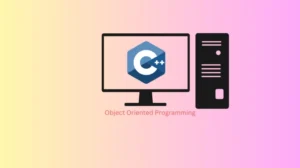Introduction of OOP

The OOP Full Form in Computer language is
O –> Object
O –> Oriented
P –> Programming
Object-oriented programming is the principle of design and development of programs using a modular approach.
The fundamental idea behind object-oriented language is to combine into a single unit both data and the functions that operate on that data.
Such a unit is called an object.
Imagine you’re building a virtual world, like a video game or a simulation. In this world, you have many different objects, like cars, animals, and buildings, each with their own unique characteristics and behaviors. Object-Oriented Programming (OOP) is like a powerful toolbox for organizing and controlling these objects.
The object-oriented paradigm is a programming methodology that promotes the efficient design and development of software systems using reusable components that can be quickly and safely assembled into longer systems.
Why is OOP Important?
1) Modularity – Building Blocks for Complex Systems
OOP promotes modularity, which means you break down your program into small, manageable pieces (objects). Each object focuses on a specific aspect of your application. This modular approach makes it easier to design, develop, and debug your code.
2) Reusability – Write Once, Use Everywhere
By creating classes and objects, you can reuse code across your application or even in different projects. This saves time and effort, as you don’t have to rewrite the same code repeatedly.
3) Easy Maintenance – Troubleshooting Made Simple
With encapsulation, you can isolate issues within an object, making it easier to locate and fix problems without affecting other parts of your program. This separation of concerns simplifies debugging and maintenance.
4) Scalability – Grow Your Project with Confidence
OOP makes it easier to add new features or extend existing ones without disrupting the whole system. You can create new classes that fit seamlessly into your application.
